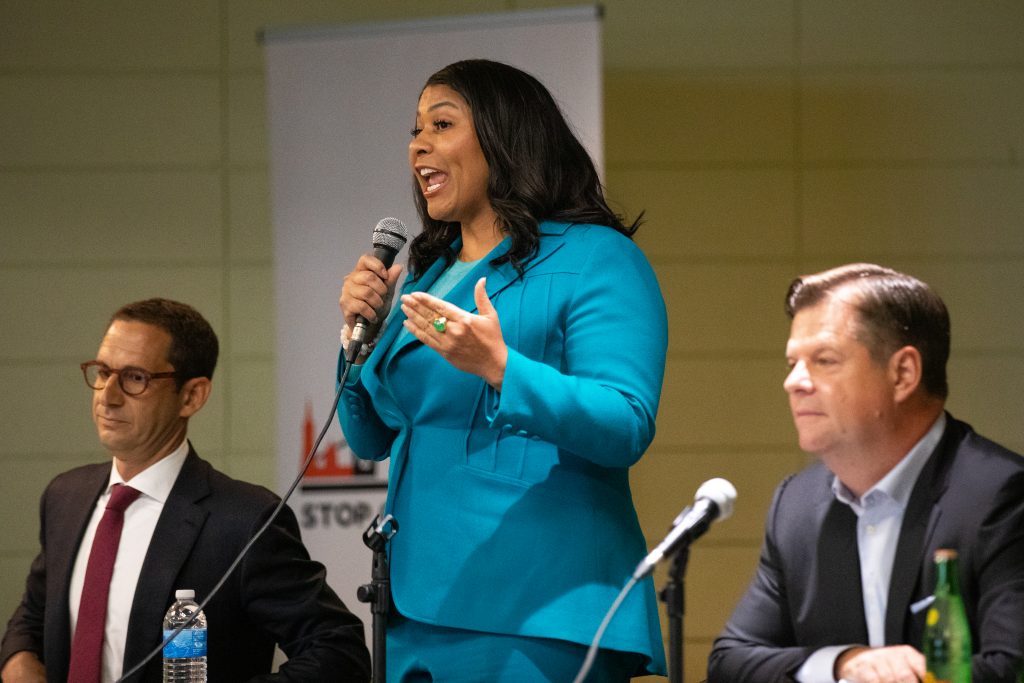Corruption, the age-old critique of local politics.
And this year, San Francisco mayoral candidates seem to enjoy singing that worn-out tune. September 19th’s mayoral debate was no exception, with Mayor London Breed being slammed for her involvement in corruption. Breed was quick to dismiss these accusations. She seemed to claim that corruption is a natural occurrence in municipalities, citing that “San Francisco has 34,000 employees and, from time to time, we have had challenges with some of them.”
Still, it’s fair to say that Breed has a number of skeletons in the closet. She was close with the former Public Utilities Commission Manager, Harlan Kelly, who was arrested by the FBI for accepting bribes. In 2018, Breed asked the California Governor to grant her older brother an early release from prison. In this request, she referenced her position as mayor and used her office’s stationery.
Perhaps most notoriously, Breed was in a romantic relationship with Mohammed Nuru, the former Public Works director who was sentenced to seven years in federal prison for wire fraud. During this relationship, Breed accepted almost $6,000 from Nuru for car repairs but never disclosed this information. These mistakes led to her being fined almost $23,000 by the San Francisco Ethics Commission.
Most recently, Breed has been involved with the latest scandal plaguing San Francisco City Hall. The scandal involves the Dream Keeper Initiative, a creation of Breed’s to invest over $100 million in addressing systemic racism towards the Black community in San Francisco. The money was meant for increasing homeownership, job training, healthcare access, and other support for economic upward mobility. Yet recent inquiries into how this money is being spent have opened a Pandora’s box of mismanagement and lack of oversight within the organization.
The director of the initiative and friend of Breed’s, Sheryl Davis, has come under scrutiny for spending on events like a $10,000 intern conference on Martha’s Vineyard. Davis also approved a $1.5 million payout for the nonprofit, Collective Impact, which is run by her partner, James Spingola. Following in Breed’s footsteps, Davis neglected to report this romantic relationship to the city.
It’s not just Breed, though. From an affair with the wife of a campaign manager to extortion of boba shops to assault over fajitas, San Francisco politics has a long history of corruption and scandal. Still, her opponents have made this a focal point in this year’s mayoral elections.
Mark Farrell, a former mayor and supervisor, focuses on Breed’s “corruption and cronyism” on his website, where he has included a list of all of her ethics violations and connections to scandals in city hall. The heir to the Levi Strauss fortune and executive of the anti-poverty non-profit Tipping Point, Daniel Lurie, has also jumped on the anti-corruption train. One of his main issues is “ethics and transparency,” which he has planned to accomplish through a set of reforms, including fully funding the enforcement division of the San Francisco Ethics Commission and ending money laundering during campaigns.
Despite low chances of winning, former supervisor Aaron Peskin has thrown his hat in the ring. Peskin introduced Proposition C, which San Franciscans will vote on in November. Prop C would create an Inspector General as an oversight to “fraud, waste and abuse” in San Francisco’s government. During the debate, Peskin criticized Breed for her involvement in the Dream Keeper Initiative, claiming that he is “the only candidate…that has consistently done the work around public corruption.”

So, San Franciscans have a variety of ethical mayoral candidates to choose from this November…right?
Not entirely. These attacks on Breed seem hypocritical, given the other candidate’s accusations of corruption. While they might position themselves as a breath of fresh air, clean of any scandal, most of the mayoral candidates do not exist above the dirty chaos of City Hall.
Farell may be the worst of the bunch. After becoming mayor, Farrell continued to use his campaign money for over three dozen ‘meetings’ in bars and restaurants, including a meal at the Michelin-starred restaurant, The Progress, for over 1,500 dollars. Farrell claimed to have been meeting with “DCCC constituents,” although he has declined to identify who these people were. Two years after winning the election, Farrell also maintained his campaign account and accepted around $2,500 in contributions from an Oyster restaurant, Mayes Oyster House. Fulfilling this comically obvious quid pro quo, the owner of the restaurant was appointed by Farrell soon after to a highly desired position on the San Francisco Small Business Commission.
Peskin and Safai, the other two candidates who have served in public office before, have also been subject to investigation by the San Francisco Ethics Commission, although for less egregious ethical lapses. Peskin has been fined twice by the Ethics Commission for misleading campaign ads and failing to disclose campaign finance information. Similarly, Safai, another current supervisor, was fined for not adhering to proper disclaimer language in his text message advertisements.
The only candidate currently in the clear is Daniel Lurie. The significance of that fact, however, is up for debate, given that Lurie has never held public office before. Still, the race is close, with Lurie just eking out an edge over Breed.
At the end of the day, however, this election has become a competition between candidates in glass houses throwing stones. November will reveal who can survive the redundancy.
Featured Image Source: flickr via Thomas Hawk
